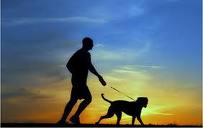Running with Your Dog
(By Julie Tobiansky – Dog Obedience Trainer - Cape Province Dog Club)
www.capeprovincedogclub.co.za

Dogs make the best running partners. They are always in the mood for a run, never oversleep, are never grumpy and as a bonus…they are great protection. Before you take your dog running with you, make sure that he or she is properly prepared. Just like you would ensure that you have a good pair of running shoes, your dog needs to be equipped for the road.
•Your dog needs to be a minimum of 1 year old to start running. NEVER run with a puppy. In fact you pup should not run free on the beach or go hiking until he is at least a year old
•Is your dog overweight? Ask your vet to recommend a suitable diet to tie in with your exercise programme and increase your dog’s exercise very slowly.
•Have a dog checked for possible joint problems like hip dysplasia. Some breeds are not designed for running and could face injury if over-exercised. e.g. St Bernards, Boerboels, Pugs and Bulldogs.
•Always run your dog on the lead. Even if your dog is obedient, he might be tempted to chase a squirrel or a cat.
•If pulling is a problem, take your dog to obedience training classes or fit him with a head collar or a purpose made “no-pull” harness. (Not to be confused with a regular harness which actually encourage pulling.)
•Never run in the heat of the day. Early morning or evening is best. Your dog could overheat or damage his pads on hot tarmac.
•Feed your dog for the job. Like any athlete your dogs needs the correct nutrition. A diet of table scraps is not adequate; invest in a good complete diet.
•Always warm him up and cool him down with a walk before and after running.
•Never run your dog on a full stomach. Offer water after the run and feed only after he has cooled down.
•Increase the length of the runs gradually as you see your dog’s fitness increase. Don’t start with 5km
Dogs are the best alarm clock. Once you have got into a regular routine of running with your dog in the morning, he’ll make sure you never miss a day! Go on……Start your running programme today.
•Your dog needs to be a minimum of 1 year old to start running. NEVER run with a puppy. In fact you pup should not run free on the beach or go hiking until he is at least a year old
•Is your dog overweight? Ask your vet to recommend a suitable diet to tie in with your exercise programme and increase your dog’s exercise very slowly.
•Have a dog checked for possible joint problems like hip dysplasia. Some breeds are not designed for running and could face injury if over-exercised. e.g. St Bernards, Boerboels, Pugs and Bulldogs.
•Always run your dog on the lead. Even if your dog is obedient, he might be tempted to chase a squirrel or a cat.
•If pulling is a problem, take your dog to obedience training classes or fit him with a head collar or a purpose made “no-pull” harness. (Not to be confused with a regular harness which actually encourage pulling.)
•Never run in the heat of the day. Early morning or evening is best. Your dog could overheat or damage his pads on hot tarmac.
•Feed your dog for the job. Like any athlete your dogs needs the correct nutrition. A diet of table scraps is not adequate; invest in a good complete diet.
•Always warm him up and cool him down with a walk before and after running.
•Never run your dog on a full stomach. Offer water after the run and feed only after he has cooled down.
•Increase the length of the runs gradually as you see your dog’s fitness increase. Don’t start with 5km
Dogs are the best alarm clock. Once you have got into a regular routine of running with your dog in the morning, he’ll make sure you never miss a day! Go on……Start your running programme today.
This article is copyrighted and remains the property of the author. Individuals are welcome to print or copy same for their own use in furthering their knowledge of dogs. However, no reproductions or alterations/variations are allowed without the express written consent of the author.
